GOD’S COVENANT WITH ABRAHAM
Genesis 15 consists entirely of a long encounter between the Lord and Abram. When the ”word of the Lord” comes to Abram in a vision to bring reassurance of God’s support for him, Abram takes the opportunity to press God with questions.
Abram asks both about his childlessness and how he can know he will one day possess the land of Canaan. God responds, and Abram believes.
God’s response includes leading Abram through a covenant ritual involving slaughtered animals, as well as a prophecy about the future of Abram’s descendants before the time will come to occupy the Promised Land.
Again, Abram is a very practical man. He believes in dealing with reality, and I think we need to do that. We need reality today in our Christian lives. If reality is not in your life, there is nothing there.
A great many people just play church today. Abram is very practical. He wants to know something, and he would like to have something in writing.
Genesis 15:7-21 KJV
[7] And he said unto him, I am the LORD that brought thee out of Ur of the Chaldees, to give thee this land to inherit it.
[8] And he said, Lord GOD, whereby shall I know that I shall inherit it?
[9] And he said unto him, Take me an heifer of three years old, and a she goat of three years old, and a ram of three years old, and a turtledove, and a young pigeon.
[10] And he took unto him all these, and divided them in the midst, and laid each piece one against another: but the birds divided he not.
[11] And when the fowls came down upon the carcases, Abram drove them away.
[12] And when the sun was going down, a deep sleep fell upon Abram; and, lo, an horror of great darkness fell upon him.
[13] And he said unto Abram, Know of a surety that thy seed shall be a stranger in a land that is not theirs, and shall serve them; and they shall afflict them four hundred years;
[14] And also that nation, whom they shall serve, will I judge: and afterward shall they come out with great substance.
[15] And thou shalt go to thy fathers in peace; thou shalt be buried in a good old age.
[16] But in the fourth generation they shall come hither again: for the iniquity of the Amorites is not yet full.
[17] And it came to pass, that, when the sun went down, and it was dark, behold a smoking furnace, and a burning lamp that passed between those pieces.
[18] In the same day the LORD made a covenant with Abram, saying, Unto thy seed have I given this land, from the river of Egypt unto the great river, the river Euphrates:
[19] The Kenites, and the Kenizzites, and the Kadmonites,
[20] And the Hittites, and the Perizzites, and the Rephaims,
[21] And the Amorites, and the Canaanites, and the Girgashites, and the Jebusites.
Genesis 15:7
And he said unto him, I am the LORD that brought thee out of Ur of the Chaldees, to give thee this land to inherit it.
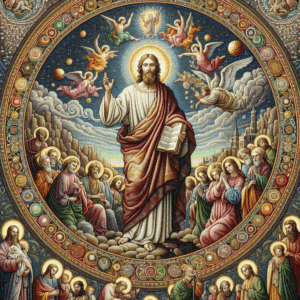 Do you know what God is probably going to tell him?
Do you know what God is probably going to tell him?
This verse continues the coming of the word of the Lord to Abram in a vision. Previously,
Abram has questioned God about not yet having a son, yet continued to believe God’s renewed promise to give him an uncountable number of descendants.
Prior verses have shown that God’s promise is that of a literal, natural, biological son (Genesis 15:4).
The Hebrew terms used also make it clear that the faith expressed in this encounter is not new—this is a continuation of the faith Abram has already placed in God (Genesis 15:6).
Now the Lord returns to His other great promise to Abram, to give Abram—and his descendants—the land of Canaan as their own possession.
As the Lord puts it, He brought Abram out of his old life, his former home, for this very purpose (Genesis 12:1–3).
As we’ll see in the next verse, Abram would like reassurance about this seemingly impossible promise, as well.
Genesis 15:8
And he said, Lord GOD, whereby shall I know that I shall inherit it?
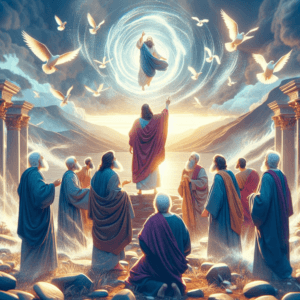 God is going to say, “Abram, I’m glad you asked Me, because I am going to meet you down at the courthouse; I will go before a notary public, and I will make real this contract which I am making with you.
God is going to say, “Abram, I’m glad you asked Me, because I am going to meet you down at the courthouse; I will go before a notary public, and I will make real this contract which I am making with you.
You are going to have a son. Meet Me down there, and I will sign on the dotted line.”
Now, before you protest, let me say that I am being facetious, you are right, that the Bible says nothing about God meeting Abram at the courthouse, and it says nothing about going to a notary public, however, in the terms of the law of our day, that is exactly what God said to Abram.
As the Lord’s conversation with Abram continues, God reminds Abram of His promise to give to him and his descendants the land of Canaan. Now Abram asks for something tangible: “How can I know I will possess it?”
Notice, as when he asked about having children (Genesis 15:2), Abram begins his question with great respect, addressing God as “O Lord God” or “Sovereign Lord.” Abram’s questions do not represent a lack of faith, accusation, or bitterness.
This passage makes it clear that Abram has already put his faith in God (Genesis 15:6), and continues to do so. This is a request for God to reveal even more of Himself to Abram—Abram is asking for reassurance.
That’s exactly what God will provide in the following verses. The symbolism of the ritual shown in these next verses is powerful, and includes prophetic hints at the future of Abram’s nation.
Along with this symbolism is a demonstration of how certain God’s promise to Abram really is.
Genesis 15:9
And he said unto him, Take me an heifer of three years old, and a she goat of three years old, and a ram of three years old, and a turtledove, and a young pigeon.
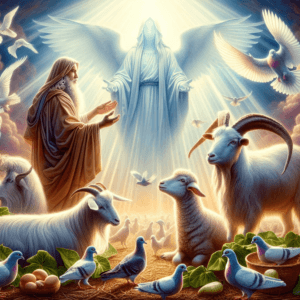 God told Abram to prepare a sacrifice. He was to get a heifer, a she goat, and a ram and divide or split them down the middle and put one half on one side and one half on the other.
God told Abram to prepare a sacrifice. He was to get a heifer, a she goat, and a ram and divide or split them down the middle and put one half on one side and one half on the other.
As the Lord’s conversation with Abram continues, God reminds Abram of His promise to give to him (and his descendants) the land of Canaan. In the previous verse, Abram asked, “How can I know I will possess it?”
Abram asks this in a respectful, humble way. He is not challenging God, or accusing Him. Rather, Abram is admitting that he cannot see a path from where he is now, to the promise God has made for him.
In response to the question, God directs Abram through the steps of a very specific ritual, formalizing that covenant promise.
The first step, in this verse, is a list of animals Abram was to bring before the Lord: a heifer, goat, and ram, each three years old, along with a turtledove and young pigeon.
The processes which follow emphasized the seriousness of this promise, on the part of God. It also includes a surprising prophesy about the future of Abram’s large family.
Genesis 15:10
And he took unto him all these, and divided them in the midst, and laid each piece one against another: but the birds divided he not.
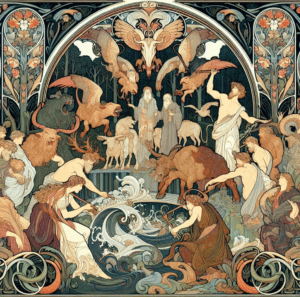 The turtledove and the pigeon he did not divide, but put one over here and one over there. Notice Abram got everything ready according to God’s instructions.
The turtledove and the pigeon he did not divide, but put one over here and one over there. Notice Abram got everything ready according to God’s instructions.
In response to Abram’s request for reassurance that he and his offspring would possess the land as God had promised, the Lord told Abram to bring five specific animals before Him.
Abram did so and now proceeds to cut the heifer, goat, and ram (all three years old) in half and to lay each half opposite the other. He did not cut the turtledove or pigeon in half.
The symbolic meaning of this bloody-but-purposeful covenant ritual will be clarified in the following verses. In part, this meaning involves a unity of those making the agreement.
According to some interpreters, this ritual was also used as a way of demonstrating sincerity; by implying that those passing between the pieces were willing to be destroyed, as the animals were, if they broke their part of the agreement.
The use of the animals also provides Abram with a symbolic picture of Israel’s future struggles under the oppressive rule of Egypt.
Genesis 15:11
And when the fowls came down upon the carcases, Abram drove them away.
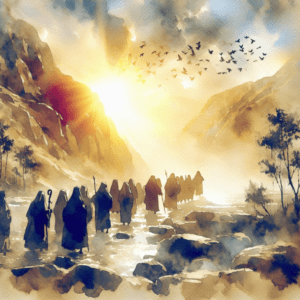 This is a very human scene. Abram gets everything ready, and while he is waiting for the Lord, the fowls of the air come down—the buzzard and the crow come down upon the carrion.
This is a very human scene. Abram gets everything ready, and while he is waiting for the Lord, the fowls of the air come down—the buzzard and the crow come down upon the carrion.
Abram is there shooing them away, for they are ready to swoop down upon the sacrifice.
If you had been there and had seen all this display of the sacrifices, knowing the custom of the day, you might have said, “Well, brother Abram, apparently the one you’re making a contract with hasn’t shown up. I guess he’s late!”
Abram would have said, “No, I don’t think He’s late. He just told me to get things ready and that He would be here to make the contract.”
In response to Abram’s question about how he would know that he and his offspring would possess the land, as God had promised, the Lord told Abram to bring five specific animals before Him.
Abram did so and then proceeded to cut the heifer, goat, and ram (all three years old) in half and to lay each half opposite the other. He did not cut the turtledove or pigeon in half.
Some scholars believe the symbolism of this ritual was meant to highlight the promise made, as if saying “may I be so destroyed if I break my part of this covenant.”
Others see it as an expression of unity: passing “inside” the sacrificial animals.
However, something dreadful happens that threatened to derail this covenant ritual between God and Abram.
Each of the five animals chosen for the ritual were “clean” animals that would be appropriate, especially under the Law, to use as a sacrifice before God.
But before the ritual is ended, a group of unclean birds of prey descend upon the remains of the animals.
Abram is forced to drive them away. This seems to be an omen of the coming 400-year affliction of Abram’s descendants described by the Lord’s prophecy in the following verses.
Genesis 15:12
And when the sun was going down, a deep sleep fell upon Abram; and, lo, an horror of great darkness fell upon him.
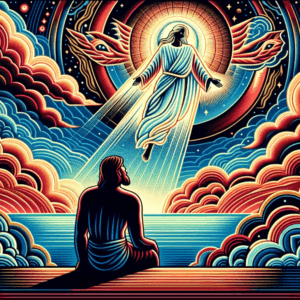 After God confirms His promise and acknowledges Abram’s faith, Abram asks how he can be sure (Genesis 15:8, not in today’s text). In response, God initiates a ceremony to affirm the covenant. This involves animal sacrifice (15:9–11).
After God confirms His promise and acknowledges Abram’s faith, Abram asks how he can be sure (Genesis 15:8, not in today’s text). In response, God initiates a ceremony to affirm the covenant. This involves animal sacrifice (15:9–11).
Yet the ceremony is not quite complete. God brings a deep sleep on Abram, perhaps one like Adam experienced before God fashioned Eve from his rib (Genesis 2:21, 22).
But Adam’s “deep sleep” is not described as coming with the horror we see here. The language used perhaps reflects that what Abram is about to learn may not be pleasant.
Abram, the man who will soon be renamed Abraham, is in the midst of a covenant ritual between himself and the Lord. In the previous verses, the Lord instructed Abram to bring to him five animals.
Abram cut a heifer, goat, and ram in half, arranging the halves opposite of each other and chasing birds of prey away from them. This attack on the covenant promise is symbolic of Israel’s future captivity under Egypt.
At this point in the story, the sun is going down. Previously, God had instructed Abram to look at the stars (Genesis 15:5). That moment either took place within Abram’s vision or on the previous night.
On this night, at dusk, Abram seems supernaturally overpowered by a deep sleep and a great and dreadful darkness.
In the following verses, the Lord will speak to Abram in a dream or vision as he sleeps or after Abram is awakened.
The upcoming words will prophesy the slavery of Abram’s descendants in Egypt, their eventual exodus, and their conquest of the sinful nations of Canaan.
Genesis 15:13
And he said unto Abram, Know of a surety that thy seed shall be a stranger in a land that is not theirs, and shall serve them; and they shall afflict them four hundred years;
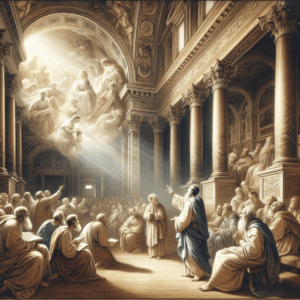 Indeed, the news is not pleasant. Abram’s descendants will not possess the land of Canaan in any real sense for hundreds of years. First, they will be strangers in someone else’s land.
Indeed, the news is not pleasant. Abram’s descendants will not possess the land of Canaan in any real sense for hundreds of years. First, they will be strangers in someone else’s land.
Not only that, their hosts in that land will subjugate them for four centuries. This is an important lesson for Abram to learn: he must show patience with God. Abram must operate on God’s timetable.
God has long-term plans. Sadly, Abram won’t learn this lesson fully, as we see him try to “push” God’s plan along with regard to having an heir (Genesis 16).
The Lord will soon complete a covenant ritual between Himself and Abram, a ritual that will specify, in part, the boundaries of future Israel to be occupied and possessed by Abram’s descendants.
First, however, God will reveal to Abram a prophecy about the difficult future his descendants will face before they occupy the Promised Land.
Abram’s offspring, God says, will be strangers, sojourners, serving others in a land that is not their own. They will be afflicted or mistreated for 400 years.
God is referring to Israel’s slavery in Egypt, after the death of Joseph (Genesis 50:26) and before the story of Moses and the Exodus (Exodus 1:1–8).
As is common in all forms of literature, the reference to time here is a generic, round number. It is perhaps meant to refer to four generations that will come and go during that time.
Exodus 12:40 and Galatians 3:17 specify the length of that captivity as 430 years.
God is making clear to Abram that, though the promise of the land will be kept, it will be kept in God’s own time, centuries in the future.
Genesis 15:14
And also that nation, whom they shall serve, will I judge: and afterward shall they come out with great substance.
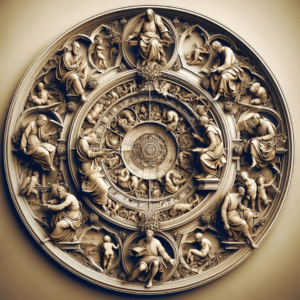 Abram probably does not welcome this news of long-term enslavement. Yet God’s justice and concern for His people will be made evident when He resolves this ominous development.
Abram probably does not welcome this news of long-term enslavement. Yet God’s justice and concern for His people will be made evident when He resolves this ominous development.
God will bring justice on the oppressors and will use those oppressors to prosper His people with material abundance. At the end of Genesis and beginning of Exodus, we learn that the Egyptians are those oppressors.
Abram is learning what Paul affirms many centuries later in Romans 8:28: “All things work together for good to them that love God, to them who are the called according to his purpose.”
This does not mean that our every experience will be enjoyable. But it does mean that God is sovereign and that ultimately He will keep all of His promises to us.
Here, God continues to deliver His prophecy about Abram’s future family. In the previous verse, God revealed that Abram’s descendants will spend 400 years as strangers and servants in another land.
Here, He continues by saying there will be an end to their captivity, and the nation that mistreated them will be judged. In fact, Abram’s future family, then a nation, will leave that country with great possessions.
Soon after this passage, Abram will be renamed Abraham, and his grandson Jacob will be renamed Israel: the father of the promised nation.
God never mentions that the nation bound to enslave Abram’s people is Egypt.
More than likely, though, Abram did not miss the similarities between these future events and what happened when he and his company left Egypt with great possessions of their own.
In fact, Israel’s captivity will begin in a very similar way to the start of Abram’s adventure in Egypt (Genesis 12:10–20). They will come seeking survival during a time of famine (Genesis 46).
Genesis 15:15
And thou shalt go to thy fathers in peace; thou shalt be buried in a good old age.
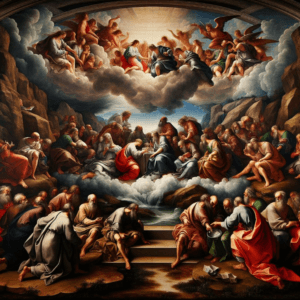 It is not for Abraham to experience personally the enslavement of God’s people. Though there will be additional struggles ahead, Abram will live many more decades and die peacefully at the age of 175 (Genesis 25:7).
It is not for Abraham to experience personally the enslavement of God’s people. Though there will be additional struggles ahead, Abram will live many more decades and die peacefully at the age of 175 (Genesis 25:7).
After revealing to Abram, perhaps in a dream, the affliction his future family will face in captivity, serving another nation, God informs Abram he will not live to see any of this.
Instead, Abram will “go to his fathers”—a common reference to death—in a time of peace and at a good, old age. Of course, at this point in time, Abram is already somewhere between 75 and 85 years old (Genesis 12:4; Genesis 16:16).
God’s words about Abram’s immediate future are a comfort, but they also let Abram know not to expect to possess the land of Canaan in his own lifetime. Instead, it will one day belong to him through his descendants.
This promise comes along with God’s prior reassurance that Abram will, in fact, see a natural-born son (Genesis 15:4). As it turns out, this promise itself will take some time for God to complete (Genesis 17:16–19).
In the meantime, Abram will be renamed as Abraham (Genesis 17:5), and will attempt to “help” God fulfill His promises by having children with his servant, Hagar (Genesis 16:16).
Genesis 15:16
But in the fourth generation they shall come hither again: for the iniquity of the Amorites is not yet full.
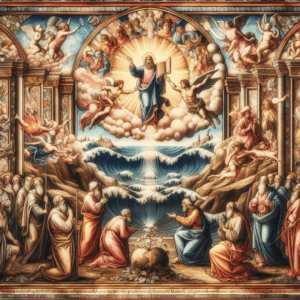 The reason that God allows His people to suffer prolonged hardship is stated in this verse. Apparently, the sin of those currently inhabiting the promised land has not yet reached a point that warrants their removal from the land.
The reason that God allows His people to suffer prolonged hardship is stated in this verse. Apparently, the sin of those currently inhabiting the promised land has not yet reached a point that warrants their removal from the land.
We should note that the term Amorites is used interchangeably with Canaanites in Joshua 7:7–9. Canaan is described as the father of the Amorites in Genesis 10:15, 16.
Here again God shows His justice. It is a mistake to assume that God so favors His people that He is willing to bulldoze whoever may be in their way in order to accomplish what He wants.
God so honors the dignity of the people living in Canaan that He refuses to punish them prematurely.
Even though God knows He will eventually drive them from the land, He does not “cut to the chase” in order to execute His edict before it is justified.
Thus God is in no rush with Abram and Sarai. God has a long time to work out His plans for His people. Of course, God could simply leave Abram and his descendants in Ur or Haran for another 400 years before the time is ripe.
But God deems this faith-building process, this long, drawn out struggle, as essential to their formation as a people. God has infinite wisdom.
God knows that a people that wanders without a home and that suffers the shackles of slavery will be best suited to be the kind of blessing to all nations that He is calling them to become.
Finally, God concludes his prophecy about Abram’s future family. In the previous verses, God revealed that they would be captives, serving another nation for around 400 years, before leaving that country with great possessions.
Then, and not before, Abram’s descendants would return to the land of Canaan “in the fourth generation.”
Later passages of Scripture will give a more specific number than this round figure: Israel will be in Egypt for 430 years, all told (Exodus 12:40).
God’s given reason for that delay is that the sin—the “iniquity”—of the Amorite people had not yet reached its full measure, or was not yet complete.
In other words, one purpose of Abram’s future family, the nation of Israel, is to serve as an instrument of judgment on the Amorite people for their sins against God.
However, God would not preemptively judge the Amorites or any other people group of Canaan.
In His justice, He would wait for them to earn the judgment He would pour out on them through His people Israel when they came to claim the land of Canaan as their own.
This delay also serves as an expression of God’s mercy, allowing that much more time for the wicked inhabitants of Canaan to see their sin and repent.
Genesis 15:17
And it came to pass, that, when the sun went down, and it was dark, behold a smoking furnace, and a burning lamp that passed between those pieces.
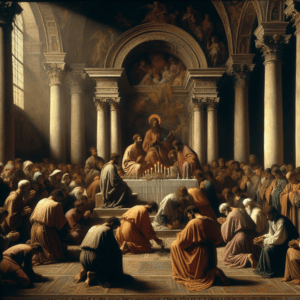 God now provides Abram the sign he requested in Genesis 15:8.
God now provides Abram the sign he requested in Genesis 15:8.
According to ancient practice, the two parties of a covenant or treaty split animals in two, and then both pass through the middle of the animals as a sign to one another that they will not forsake their commitment.
In passing between the parts, each party is essentially saying, “If I drop my end of the bargain, may I become like these animals here” (compare Jeremiah 34:18).
It is noteworthy that Abram does not pass between the pieces; only the symbols of God’s presence do so. The symbol of a smoking furnace resembles the oven used for baking offerings in Leviticus 2:4.
The symbol of a burning lamp might reflect God’s judgment as in Job 41:19 and Zechariah 12:6.
Though Abram has an important part to play, the primary role for him and his descendants is to bear witness to God’s fulfillment of His promises for His people and the world.
This serves as an important reminder to Abram that it is not his job to engineer the fulfillment of God’s promise to him, but to wait on God’s timing and God’s strategy for fulfilling it.
God and Abram are not equal partners, as in human-to-human covenants.
And so it is yet today: our primary role is to respond faithfully to the tasks that God has given us and not try to remake the Great Commission (Matthew 28:19, 20) according to our liking.
After God completes His prophecy about Abram’s descendants, He returns to the covenant ritual that began with Abram dividing and arranging the halves of the animals God had instructed him to bring (Genesis 15:9).
Now the sun goes down, and God completes the ritual. Whether Abram is now awake and sees it with his own physical eyes, or sees this event in his vision or dream, we don’t know for sure.
Either way, what Abram sees is remarkable. In the dark, two items move between the halves of the animals. One is a smoking fire pot, something that served as an oven in Abram’s day. The other is a flaming torch.
In the narrative itself, we’re not told what these two items represent. However, fire is often associated with both God’s judgment and His holiness.
In addition, these elements of smoke, fire, and the various kinds of animals later used for sacrifice under the Law point to God’s future relationship with Israel.
Finally, in moving between the two halves of the animals, God is apparently finalizing the agreement between Himself and His people through Abram. This aspect, in particular, is important for its symbolism.
Scholars suggest that this ritual—passing between the halves of sacrificed animals—was meant to imply a binding oath on those who participated.
By walking between the animals, the person was accepting that same destruction if they broke their end of the bargain.
Pointedly, note that Abram does not pass between the halves—only God does, via the symbolism of the pot and flame. The promise God has made here is entirely dependent on His will and His work.
Abram had begun this part of the conversation by asking the Lord how he would know if God would keep His promise to give Abram and his descendants the land of Canaan.
Abram’s dramatic experience of God’s answer in performing this covenant ritual would surely have made a lifelong impression on him.
Genesis 15:18
In the same day the LORD made a covenant with Abram, saying, Unto thy seed have I given this land, from the river of Egypt unto the great river, the river Euphrates:
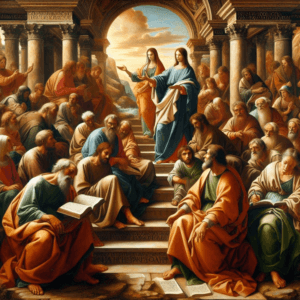 God reiterates His commitment to Abram: God will give the promised land to Abram’s seed. This is all that Abram needs to know.
God reiterates His commitment to Abram: God will give the promised land to Abram’s seed. This is all that Abram needs to know.
Though he may want more, he will have to take God at His word—first spoken orally and now enacted in human terms with the kind of covenant ceremony with which Abram is familiar.
Directly to the east of the promised land is a massive desert that separates Babylon from Canaan. Directly to the west is the Mediterranean Sea.
So the only two borders Abram needs in order to identify the land of promise is one to the north, which is the river Euphrates, and one to the south, which is the river of Egypt.
The river mentioned likely does not refer to the Nile River, but to a smaller, seasonal river.
This is perhaps Wadi el-Arish, which serves as the traditional Egyptian border (see also Numbers 34:5; Joshua 15:4).
With the covenant ritual between the Lord and Abram completed, God gets very specific about the boundaries of the land He is promising to Abram and his descendants.
Covenants between God and humans are significant, of course. Often they include conditions from God which, if met by the people involved, will result in God keeping His end of the agreement.
This covenant is different. Sometimes referred to as the Abrahamic Covenant, this was an agreement in which all the conditions and promises were on God’s side.
For example, in the prior passage, God symbolically passes between the severed halves of the animals.
This might have been a common ritual of that era, where both parties declared their obligations by walking through the middle of the carcasses.
Notably, only God is shown to do this in the preceding verses—Abram’s work is not part of this promise.
God was binding Himself to do as He promised no matter what Abram or Abram’s descendants did or did not do. Put another way, this promise from God to the people of Israel to give them this land, was a unilateral covenant.
In defining this Promised Land, God begins at the southern border with the “river of Egypt,” which many scholars identify as the Wadi el-Arish River, not the Nile. The northern border would be the great Euphrates River.
The following verses will define the remaining areas of the land promised to Abram’s offspring in terms of the people groups occupying those lands previously.
Genesis 15:19
The Kenites, and the Kenizzites, and the Kadmonites,
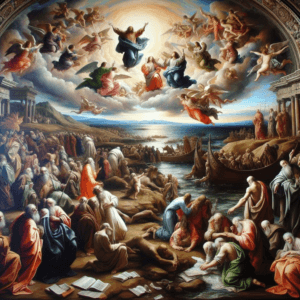 God now marks out the land that He is promising to Abram. In the previous verse, God established His unilateral covenant with Abram and his descendants.
God now marks out the land that He is promising to Abram. In the previous verse, God established His unilateral covenant with Abram and his descendants.
This is a promise which depends only on one side’s agreement: in this case, God’s vow, which He will fulfill no matter what Abram or his descendants do.
That covenant includes possession of the land of Canaan as defined by God Himself. Verse 18 revealed the southern and northern borders to be the “river of Egypt,” meaning the Wadi el-Arish River, and the Euphrates River, respectively.
Now the Lord continues to define the areas of the nation His people will possess in terms of the people groups occupying those lands previously.
He begins in this verse by naming the lands of the Kenites (who lived in the south), the Kenizzites, and the Kadmonites.
Genesis 15:20
And the Hittites, and the Perizzites, and the Rephaims,
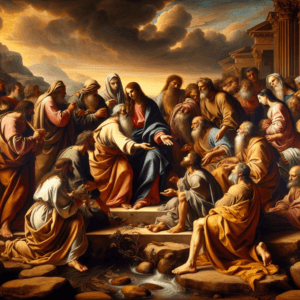 By the way, what did Abram promise to do? Nothing. He believed God.
By the way, what did Abram promise to do? Nothing. He believed God.
In the previous verses, God established the southern and northern borders of the Promised Land to be the Wadi el-Arish River, referred to here as the “river of Egypt” the Euphrates, respectively.
That covenant includes possession of the land, based solely on God’s work, and not on the efforts of Abram or his descendants.
Now the Lord continues to define the areas of the nation His people will possess in terms of the people groups occupying those lands previously.
This verse lists the Hittites and Perizzites, both well-known occupiers of the land of Canaan, as well as the Rephaim, one of the people groups defeated by the four kings of the east in the previous chapter (Genesis 14:5).
Genesis 15:21
And the Amorites, and the Canaanites, and the Girgashites, and the Jebusites.
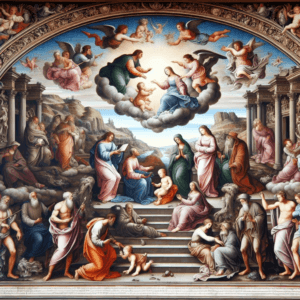 And God will save you—save you by grace—if you will believe what He has done for you. The Lord continues to define the area His chosen people will possess, by naming more of the people groups which currently occupy it.
And God will save you—save you by grace—if you will believe what He has done for you. The Lord continues to define the area His chosen people will possess, by naming more of the people groups which currently occupy it.
This is in the context of God’s vow to grant all the land between the Wadi el-Arish—the “river of Egypt”—and the Euphrates to Abram’s descendants.
This final verse lists the Amorites, who were already mentioned as the future recipients of God’s judgment, as well as the Canaanites, the Girgashites, and the Jebusites.
I hope that you have really enjoyed this post,
Please Leave All Comments in the Comment Box Below ↓

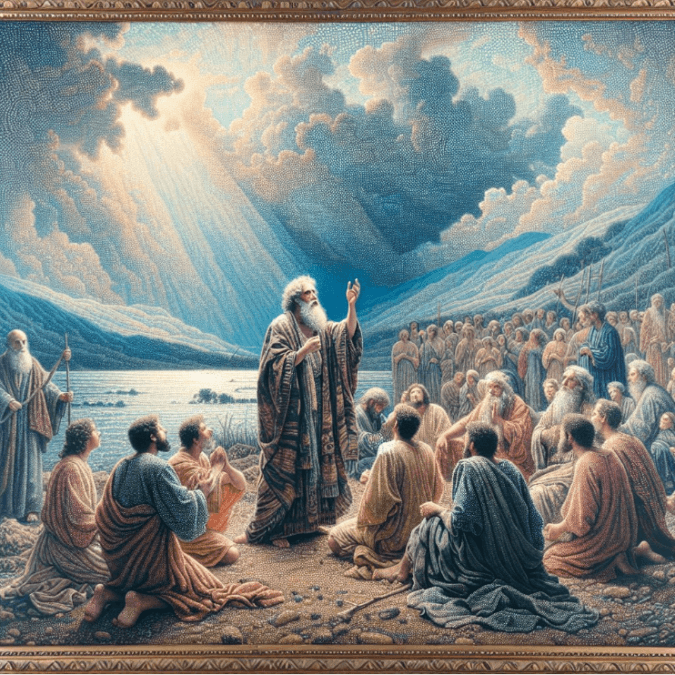











Thank you for sharing this insightful article on God’s covenant with Abraham and providing a detailed commentary on each verse. It’s fascinating to explore the depth of this ancient biblical text and understand the significance of God’s promises to Abraham and his descendants.
The passage from Genesis 15 illustrates Abraham’s practical nature and his desire for reassurance from God. He sought tangible signs and confirmation of God’s covenant, and God responded in a profound way, demonstrating His commitment through a covenant ritual.
The covenant, as you explained, was unilateral, with God making binding promises to Abraham and his descendants. It’s a powerful reminder of God’s faithfulness and His plan to fulfil His promises in His own time.
The mention of various people groups in the Promised Land highlights the intricate details of God’s covenant and His awareness of the land’s occupants. This passage underscores the divine wisdom and sovereignty of God.
Thank you for sharing this valuable commentary, which enhances our understanding of God’s covenant with Abraham and its significance in the larger biblical narrative. It reminds us of the importance of faith, patience, and trust in God’s promises.
Hello Demi Foster,
I appreciate you taking the time to let me know that you feel that you view GOD’S Covenant With Abraham – Prepare A Sacrifice as an insightful article.
Your comments are definitely appreciated, I’d love to hear back from you about other episodes.
Thanks for stopping by,
Blessings My Friend!
Thank you for sharing this insightful post on Abraham and the covenant.
God is faithful and we can trust Him to fulfill His promises to us. So Abraham didn’t need to meet God at the courthouse to sign anything, God is always true to His word.
The detailed explanation that you provide after each verse, makes it clear to follow and easy to understand. We can all learn from this valuable post.
Hello LineCowley,
Thanks for commenting on another HBS & DwJ Podcast episode.
Yes, Our God is, Soo Awesome!
Feel free to listen to the HBS & DwJ Podcast on iHeart, Apple Podcast, YouTube, or where-ever you get your podcast.
Blessings My Friend!
I found your exploration of God’s covenant with Abraham and the significance of preparing a sacrifice to be enlightening.
It beautifully highlights the deep spiritual connection between faith and action.
Have you personally experienced a moment where a symbolic act of faith deepened your spiritual understanding?
I’d love to hear about it.
Additionally, your reflection on the symbolism of animals in sacrifices is thought-provoking. It underscores the idea of surrendering our attachments and placing our trust in a higher power.
How do you think this ancient practice resonates with modern believers seeking a deeper connection with the divine?
Your insights provide a valuable perspective on the enduring relevance of these spiritual traditions.
Thank you for sharing this insightful piece.
Hello again pasindu,
I appreciate you taking the time to let me know that you found my exploration of God’s covenant with Abraham and the significance of preparing a sacrifice to be enlightening.
When I got baptized, I personally experienced a moment where a symbolic act of faith deepened on my spiritual understanding.
The ancient practice of animals sacrifices should resonate as a symbol of a temporary sin offering, because that is what it was, temporary. This is how I think this ancient practice should resonate with modern believers seeking a deeper connection with the Divine Higher Power.
Thank you for appreciating my insights as a valuable perspective on the enduring relevance of these spiritual traditions.
You are most certainly welcome for the sharing of this insightful piece.
Blessings My friend!
Hi there,
I recently came across your article on God’s covenant with Abraham, and I must say, it’s quite thought-provoking!
You’ve done a commendable job explaining the depths of Genesis 15 and the significance of the covenant. The way you’ve connected ancient rituals and symbolism with the faith journey stands out.
However, there’s one aspect that piqued my curiosity. You mention the “smoking furnace” and the “burning lamp” in Genesis 15:17, symbols of God’s presence during the covenant.
Considering these elements, do you think there’s a deeper layer of interpretation regarding God’s promise and presence amidst human suffering and waiting periods?
It seems like there’s a profound parallel here with the trials believers face, waiting for God’s promises to materialize.
Thank you for your work and sharing.
Best,
Makhsud
Hello Makhsud,
Thank you for taking the time to stop by and comment, as well as considering this a commendable job explaining the depths of Genesis 15 and the significance of the covenant.
According to
Romans 5:12 KJVS
Wherefore, as by one man sin entered into the world, and death by sin; and so death passed upon all men, for that all have sinned:
Paul starts with Adam, though he is not mentioned by name for several verses. Paul states that sin came into the world through one man. This one man is Adam, the first man created from dust by God Himself (Genesis 1:27).
God breathed life into Adam and placed him in the garden of Eden with only one restriction: Don’t eat from the tree of the knowledge of good and evil (Genesis 2:15–17). Adam, along with his wife, Eve did exactly what they were told not to, and sin entered the world.
It’s worth noting here that the term “world,” in this context, is specifically a reference to humanity. Paul’s discussion here is entirely focused on the relationship between human beings and God. Interpreters differ on whether or not this verse supports that all death—including that of animals—is implied in this statement.
What’s clear from Paul’s argument here is that death followed sin, as God said it would. First, God slaughtered an animal to provide clothing for Adam and Eve, suddenly made aware of their nakedness by their sin (Genesis 3:21). More than that, though, Adam and Eve were sent away from God and from the garden and began to die physically.
They became mortal beings with a limited lifespan. Even worse, Adam and Eve passed on their sin to their offspring. Every person ever born in the world, other than Christ (Hebrews 4:15) was born sinful and destined to die. Sin always leads to death, as Paul will make clear in the following verses.
This was the tragic and seemingly inescapable result of Adam’s first sin in the garden.
You are welcome for the sharing of this work.
Blessings To You My Friend!
This article provides a detailed and insightful analysis of the covenant between God and Abraham as described in Genesis 15.
It highlights the practical nature of Abram’s character and his desire for reassurance from God. The article does a great job of breaking down each verse and explaining the significance of the covenant and its symbolism. It also emphasizes God’s faithfulness and the fulfillment of His promises, even when they may take time to come to fruition.
I have a question. In this article, you discuss the significance of the covenant ritual involving the slaughtered animals and the smoking furnace and burning lamp passing between them.
Can you provide more insights into the symbolism of these elements and what they represent in the context of God’s covenant with Abram?
Hello Leila,
Thanks for commenting on this HBS & DwJ Podcast episode.
According to ancient practice, the two parties of a covenant or treaty split animals in two, and then both pass through the middle of the animals as a sign to one another that they will not forsake their commitment.
In passing between the parts, each party is essentially saying, “If I drop my end of the bargain, may I become like these animals here” (compare Jeremiah 34:18).
It is noteworthy that Abram does not pass between the pieces; only the symbols of God’s presence do so. The symbol of a smoking furnace resembles the oven used for baking offerings in Leviticus 2:4.
The symbol of a burning lamp might reflect God’s judgment as in Job 41:19 and Zechariah 12:6.
Though Abram has an important part to play, the primary role for him and his descendants is to bear witness to God’s fulfillment of His promises for His people and the world.
According to ancient practice, the two parties of a covenant or treaty split animals in two, and then both pass through the middle of the animals as a sign to one another that they will not forsake their commitment.
Blessings My Friend!